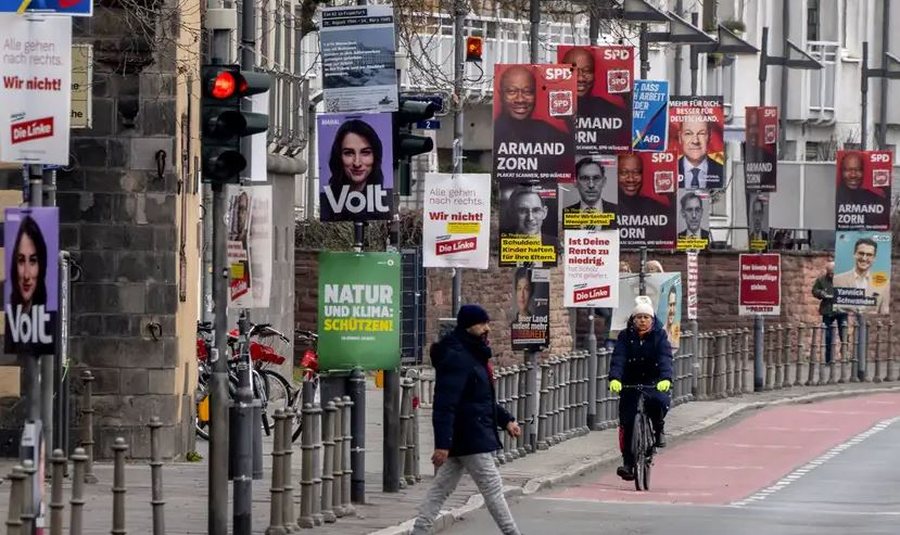
The election campaign was short but fierce. One word was often repeated: change course. "You tried to do left-wing politics in Germany for three years. You can't go on like this anymore," said Friedrich Merz, the chancellor candidate of the conservative CDU/CSU parties, two weeks before the election.
In the Bundestag, he addressed the SPD and the Greens, who, together with the FDP, had been in a center-left three-party coalition since 2021. In November 2024, the government collapsed after months of debate over the lack of funds in the budget. This situation led to early elections on February 23.
The SPD faces a heavy defeat
While the Greens maintain a similar level of support in the polls to that of 2021, the SPD and FDP have suffered a significant decline. The FDP risks not passing the 5% threshold, while the SPD is threatened with a historic defeat. Any result below 20% would be the worst for the party in its post-war history – and polls show it well below that threshold, currently at 14%. Olaf Scholz would thus become the chancellor with the shortest term in the last 50 years and the only Social Democrat not to have been re-elected as chancellor.
Union in the lead, AfD in second place
According to polls, Friedrich Merz has the best chance of winning the chancellorship. The CDU chairman leads the CDU/CSU Union, which, after ruling the country for 16 years, went into opposition in 2021 and is now seeking to return to power. In second place, with around 20% of the vote, is the AfD, a partly far-right party. This is double its result in 2021.
How did the SPD fall and the AfD rise?
The CDU's chancellor candidate, Friedrich Merz, blames the economic downturn. "Our national economy is now the last in the European Union," he says. 50,000 companies have declared bankruptcy and around 100 billion euros in business capital is leaving the country every year. "Our economy is shrinking, we are in recession for the third year in a row. This has never happened before in Germany's post-war history."
According to Merz, Scholz and his Economy Minister, Robert Habeck, who is running as the Greens' candidate for chancellor, "no longer understand reality." "Do you know what you look like to me?" he said to his opponents. "Like two hired directors who have led a company to bankruptcy and are now telling the owners: We want to keep it going for another four years."
War, energy crisis, inflation
While Merz increasingly criticizes the current government, Chancellor Scholz is increasingly defensive. He says it is not his government's fault, but Russia's aggression against Ukraine that has caused the energy crisis and inflation. According to Scholz, the economic difficulties will continue due to the unexpected policies of US President Donald Trump. "The wind is blowing against us. And the truth is: this situation will not change fundamentally in the coming years."
AfD ready for coalition with CDU/CSU
The weak economy was one of the most talked-about topics during the election campaign. But after a deadly stabbing attack by a rejected asylum seeker in Aschaffenburg, the migration issue came to the fore. Friedrich Merz called for tougher asylum policy and warned that, if necessary, he would support it with AfD votes.
AfD members were delighted when a CDU/CSU motion for stricter asylum regulations was accepted for consideration in the Bundestag at the end of January. The motion was ultimately defeated by the votes of other parties and some CDU members, but for the far-right AfD, it was a victory. "A new era begins here and now," said Bernd Baumann, the leader of the AfD parliamentary group. "Something new is beginning and the AfD is the party that will lead this change." He declared his party ready for a coalition with the CDU/CSU.
Merz rules out coalition with AfD
After this vote, hundreds of thousands of citizens took to the streets to protest against the growing influence of the far right in Germany. Scholz also criticized the conservatives' cooperation with the AfD. "It is not unimportant whether or not you cooperate with right-wing extremists. Not in Germany!", he said. He added that citizens cannot trust that the Union will not cooperate with the AfD after the elections. In subsequent television debates, Friedrich Merz categorically ruled out any possibility of cooperation with the AfD. According to him, the AfD's goal is to destroy the CDU/CSU and a coalition with the AfD will never happen.
Who can form the new government?
But Merz will not have enough votes to govern without a coalition partner. The more parties enter the Bundestag, the more complicated the relations and the formation of a government become. The left is expected to reach the threshold of entering parliament, while the new BSW party and the FDP are at risk. If the FDP enters the Bundestag, a three-party government will probably be needed. But the FDP liberals have said they do not want to enter a coalition with the Greens again, leaving only an alliance between the CDU/CSU, SPD and FDP as an option. If the FDP or BSW do not enter parliament, the other possibilities are a coalition between the CDU/CSU and the SPD or between the CDU/CSU and the Greens.
AfD remains isolated
The AfD is unlikely to enter any coalition, but its leader Alice Weidel stated that the new government will continue the current policy and that change will happen anyway, but "it will just be delayed."
The February 23 elections will determine Germany's future political course. (A2 Televizion)











